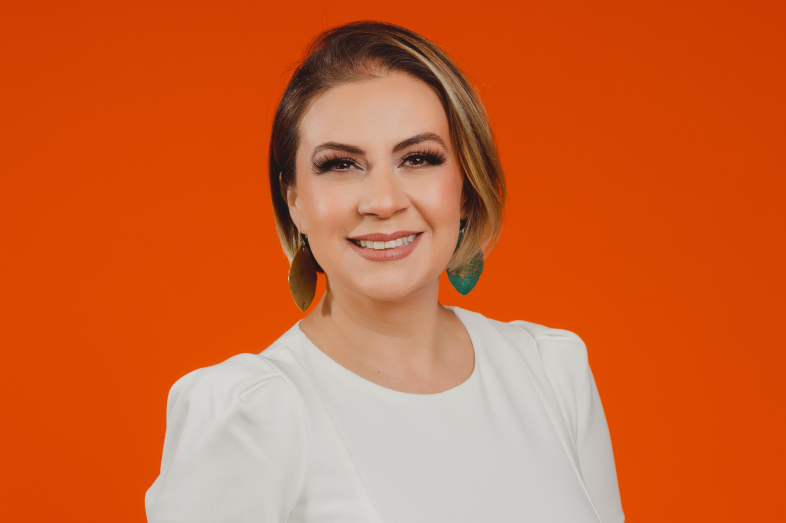Read in Spanish.
Veteran journalist Maritza Félix is the definition of what the American dream is supposed to be. She’s very vocal about what fueled her journey.
While completing the long and expensive process to become a U.S. citizen, she achieved great success, including earning an EWA Fellowship and a John S. Knight Journalism Fellowship at Stanford University. Originally from Sonora, Mexico, Félix is also a five-time Emmy awards winner.
“I’m proud of being an immigrant,” Félix said. “I’m proud of being a Latina. I’m proud of my accent. I’m proud that I can speak more than one language. I’m proud that I’m from a very, very small town. And I want more Latinos to feel the same.”
Félix’s meaning of success comes from helping her community rather than awards.
What started as a WhatsApp group to fact-check COVID-19 coverage across the Arizona-Sonora border became Conecta Arizona, the community journalism project Félix founded. The project includes experts who amplify Latinx community concerns.
Conecta Arizona includes a segment called La Hora Cafecito (or in-app coffee breaks) for members to engage with public officials to get trusted information about education, health or politics. Covering education is especially important to Félix. She has 8-year-old twins who inspire and motivate her to prevent misinformation about issues affecting students and schools.
“In Latin America. Cafecito is what you get with your best friends. You have coffee. You talk about everything. You interrupt each other, and you jump from one topic to the other. That’s exactly what happens in WhatsApp,” Félix explained. “We have had doctors, immigration attorneys, activists, teachers, emotional-health therapists, psychologists, and thanatologists – a little bit of everything to talk about the topics that are most pressing and important for my community. La Hora Cafecito forced me to stop and start listening.”
In this Member Spotlight, Félix explains how Conecta Arizona helps Arizona-Sonora borderlands residents. She also explains the differences in education and education reporting in America and Mexico, and details her path to public service and entrepreneurial journalism.
How did Conecta Arizona start?
Félix: I became a freelance journalist in 2018. I was working on producing for Al Jazeera for different projects in the United States, Mexico, and Europe. In 2020, when the pandemic hit, I was working on a documentary, and everything was canceled and postponed.
With the border restrictions, my family stayed on the [Mexico] side of the border, and I stayed on the U.S. side of the border. [My mom] was sending me these things that she found on the Internet.
I started doing the fact-checking for her, then my aunts, then my friends, and then I created Conecta Arizona just for my friends and relatives. It grew organically to [include Arizona and Mexico residents].
Even though we are separated by the border, we’re always united by family, by friends, and by culture. So in the beginning, it was just sending the news of the day or a fact-check or debunking amid coronavirus.
But then we started having “La Hora Cafecitos” every afternoon about the news and concerns [about] things they were saying online. I couldn’t answer all the questions, so I started inviting experts to join us in “La Hora Cafecito” on WhatsApp.
At the same time, I was working on my fellowship for EWA about kids with disabilities who only spoke Spanish. And this experiment – that I thought was going to last just a couple of months – is two years and a half now. We keep growing, and we’re so proud of it.
Do you have any tips for journalists interested in entrepreneurial journalism?
Félix: The present and the future of journalism needs to be independent, transparent, bi-national, or national. It needs to be collaborative.
Being a Latina who works in Spanish in the U.S., I felt in limbo because I was the Latina who was working in Spanish. I didn’t fit in at so many tables. I realized that I was always fighting for a seat at a table. It’s very exhausting.
We built our own table, and everybody can fit. Everybody can build their own, and we can put it together. Even though they don’t look the same, we’re a bigger table with more people, and we can find a place for everybody.
I wasn’t planning on becoming an entrepreneur. I wasn’t planning on building my own news organization. In the beginning, it was just an experiment. Just an answer. Just a bridge to fill one part of the huge gap that we have created in border states, in English and Spanish.
Can you describe your audience and the education issues they care most about?
Félix: I am noticing a shift in what [the community wants from] education reporting. They want more proactive, more in-depth reporting about issues and more reporting that actually generates a change in policy and laws.
- Immigration: We have so many mixed-immigration status families in our groups.
- Personal Finance: They want to learn about finances: How to prepare for college without being in debt forever.
- School Vouchers, Gun Control and Mental Health: Those three issues. They’re tired of being afraid of somebody bringing a gun to school. They’re forced to be prepared for a shooting in the school.
- Teacher and Staff Shortages: They are tired that teachers are underpaid, and the schools are understaffed. In the end, that anxiety [affects] their kids’ education, and that’s something that they shouldn’t [deal with]. The kids are losing the best educators they could have. They’re not willing to pay a good living wage [to teachers].
- Parent Engagement Barriers: The transition [from another country to the U.S.], how do we get parents involved in [their] kids’ education when they don’t know the system, and they don’t speak the language?
- Dual-Citizen Challenges: We are a border state. So we do have a lot of dual citizens who go back and forth [across the border]. Sometimes, they’re born here, and they get to study in Mexico, and then they come back to go to university in the U.S.
But they don’t know the system sometimes. They were born in Mexico, but we’re so close to the border that they want to study here in the U.S. They don’t know how to do it or how to get scholarships for foreigners in Arizona.
- Other Concerns: What content are kids getting? Why don’t [we] have more options for ethnic studies, learning Spanish in school, [and classes] about civil engagement?
What other topics do you cover?
Félix: We debunked more than 300 myths about health and vaccines. We cover a little bit about everything.
Something that we realized is the “pandemic of mental health.” Education, family grief, border restrictions – everything that is related. So we have been focusing a lot on mental health reporting.
We’re talking a lot about death, about grief and losses during the pandemic.
How do you work to combat misinformation and disinformation about education issues?
Félix: [We have] an expert joining us to talk about school safety: How to talk to kids about what happened, what teachers are going to do to prepare themselves in case something like [a shooting] happens in school or the policies around that.
It’s not uncommon that in every legislative session, we would have a bill related to education, and this year, it was school vouchers.
We have so many different points of view, and I’m really proud that Conecta Arizona is the place where those community members, the activists, the school representatives, the teachers get together and talk about why school vouchers are good, [and] why are they bad?
[We] work on a recap of all those conversations and bring it out there, so the community can make their own choices. [It’s] really important to have conversations about education and other topics.
What is the current state of education-related resources and news for Spanish-language readers?
Félix: It is really bad. If you have a cake and you cut it, the Spanish-speaking media and reporters always have the tiny slice. There are very few resources that are in Spanish. There are very few experts on hand that we can reach out to inform that community.
Even though we speak English, and we can do the interview and speak in English, if I want to invite them to the Cafecito and they don’t speak or write in Spanish, that’s a waste of time. It’s like nobody can communicate directly to them.
For example, in panels, when they’re talking about disparities between Latinos and brown kids, I don’t see any Latinos who speak Spanish on the panel giving their opinions.
I feel really frustrated. We need to do a better job trying to include all the voices and accents and backgrounds in those conversations. That’s why I’m always fighting to have stuff in Spanish everywhere.
How does education reporting in Mexico compare to the U.S.?
Félix: The pandemic changed a lot about how we cover education everywhere in the world.
In Mexico, during the pandemic, the TV stations were forced to put the classes and their curriculum in their programming. That’s something that we didn’t have in the U.S.; there was more access to the internet and public devices that were given to the parents.
So there are a lot of differences in having a binational group. It forces us to compare where we are, where we’re going, what Mexico is doing better, what the U.S. is doing better, and what we need to fix in both systems.
How does the school system in Mexico compare to the U.S.?
Félix:
- Geography Education: In the U.S., you teach about seven continents. In Latin America, we only have five. How they grade is completely different.
- Active-Shooter Training: With the trainings we have [in Arizona], my kids know what to do in case of an emergency and [during] an active shooting. We don’t do that in Mexico, in Latin America, even though we live in a very violent society. We don’t get those trainings.
- Public and Private Schools: Public schools are completely different in Mexico than here. If you want to have private education in Mexico, you need to spend a lot of money.
- Charter Schools: We don’t have charter schools in Mexico. That’s not a thing. And my kids go to a charter school in the U.S., so it was like learning what a charter school is. There are so many differences.
Where else would you like to see the Conecta Arizona model thrive, and why?
Félix: We had conversations about the possibility of bringing [the model] to California and Texas as well to [their] border communities and Florida.
The first challenge is to make this [Conecta Arizona] project and all its products sustainable first before going to the next stage. We have grown a lot really fast, and we want to establish that first and then keep moving forward to have other connectors everywhere.
The magic of Conecta Arizona is listening. It’s not just the platform; WhatsApp can be temporary. We don’t know where our community is going to be in the next five years, but if we learn to listen and then create, that’s something that can be taken [from] one platform to the next one. We are not married to WhatsApp. It was even a surprise even for me.

